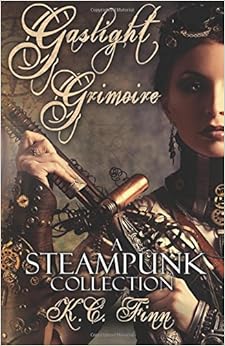 Author: K. C. Finn
Author: K. C. FinnGenre: Steampunk
Pagecount: 176
Warnings: Death, Enslavement, Violence, Racism, Sexism
Rating: 3/5
"Gaslight Grimoire" by K.C. Finn is a collection of short stories that effortlessly combine elements of steampunk and dark fantasy in a wide variety of settings and circumstances throughout the late 19th century. The premise of each story is unique while maintaining a misty, clanking atmosphere.
There are a total of twelve stories, and while I enjoyed all of them, there were two that stood out as my favorites, "Master Mind" and "Mira and the Maw". The thread that links them is what links almost all of these stories: a fantastic premise and a good atmosphere. "Master Mind" is centered around a historical machine called the Turk, with an ending that I refuse to ruin but fit perfectly. "Mira and the Maw" on the other hand centers around Mira, a 'steampunk zombie hunter' as referenced in the foreword, who is basically Girl Genius (and also an actual girl genius). It's one of the slower builds in the collection, which gives us time to look past the flashy aspects of the story and take in the characters, so when the tale concludes you're invested in Mira surviving and possibly outshining Buffy.
As far as a general opinion of the collection I'm of two minds. As I said, I think the strongest aspect of the anthology is it's atmosphere. All of the stories have a similar feel, which does a great job using the outlandish premises and varied locales of steampunk and combining them with the equally fantastic premises and bleak morality of dark fantasy. It can be a bit much for someone who doesn't like one of these genres a great deal, but if you're willing to go along on some truly weird adventures it's a wonderful read. Settle down on a rainy day and gobble these twisted fairy tails up!
However be warned, the characterization in these stories is definitely a weaker aspect. I liked a few characters, like Mira from "Mira and the Maw" and Galileo from "Galileo's Mistake", but during most stories I wasn't attached to anyone. That's hardly surprising, it's damned difficult to get invested in a character when you have maybe 10 pages with total. In any individual short story I don't mind that much either, as they don't last long. But for me it was a consistent problem, that when I peered behind the flashy scenes I found... one dimensional people.
Now for the a more general nit-pick: I try not to do this with every book because it's exhausting, but while I was reading I started noticing the cast list was a looking a bit sausage-y. How sausage-y you ask? By my count 23% of the narrators and 25% of the speaking characters are women, which can't be good for a species that pair-bonds. In addition about 10% of the speaking characters are POC, which would be reasonable for the UK in 1900, but not for 2016. I don't mean to notice it, but once I know a book's cast skews that white and dudely for no reason it takes away from my enjoyment of a book a bit. I start wondering what happened to Victorian steampunk world that they have such a shortage of women. How will the human race repopulate? Why is no one talking about the obvious racial apocalypse? And if this was just oversight on the author's part, why are fairies and steam-powered hearts okay but altering the racial and gender politics of the 1900's isn't?
